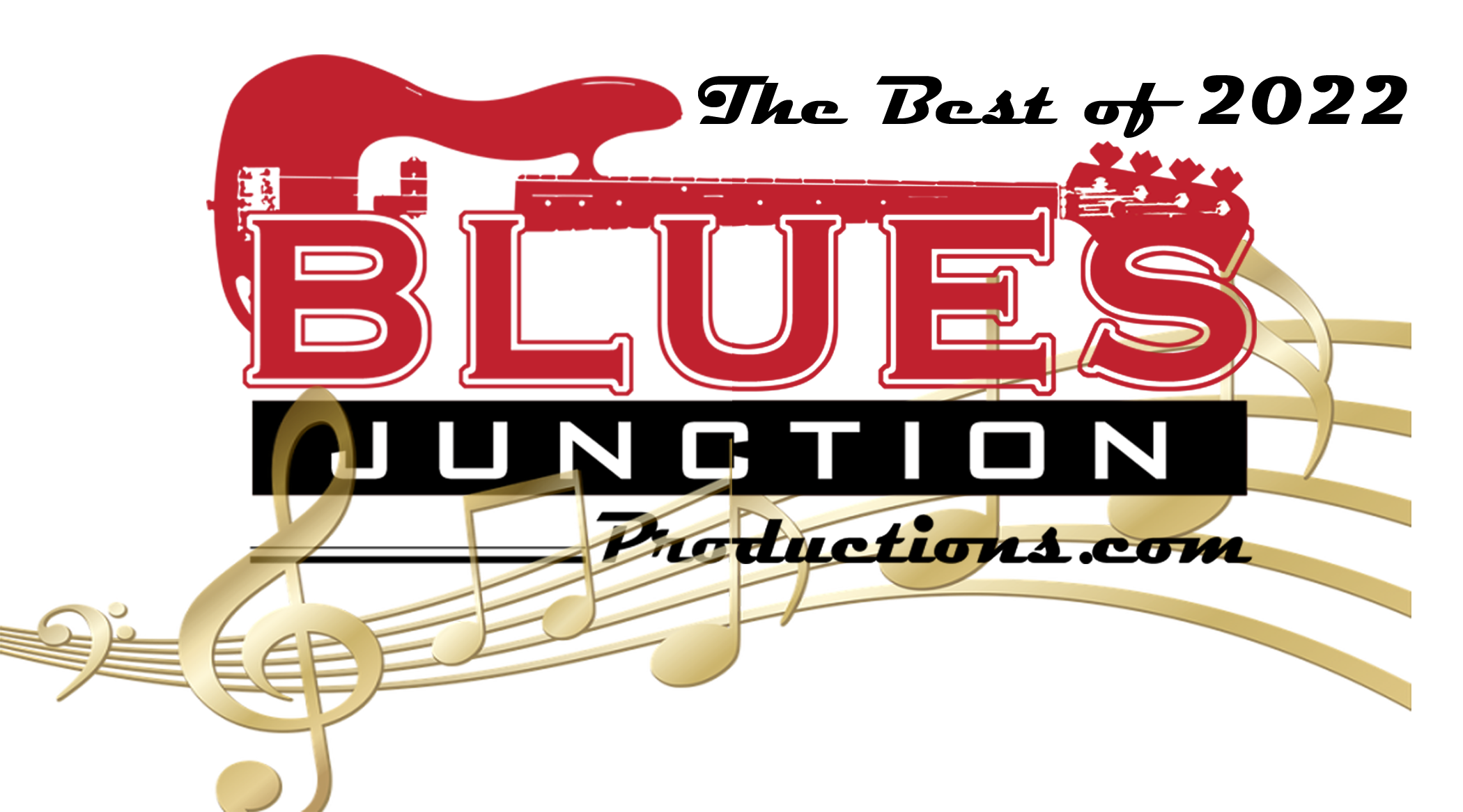
BLUES JUNCTION Productions
7343 El Camino Real
Suite 327
Atascadero, CA 93422-4697
info
- Home
- Letter From the Editor
- Tom Hyslop: A Personal Appreciation
- Top Ten Albums of 2022
- Dave's Top Ten List of Top Ten Lists
- An Appreciation of James Harman
- Album of the Year: The Duke Robillard Band They Called It Rhythm & Blues
- Album Review: Rick Holmstrom Get It!
- Album Review: The Phantom Blues Band - Blues for Breakfast
- Album Review: Bob Stroger & the Headcutters That’s My Name
- Album Review: Hash Brown - Stop! Your Evil Ways
- Archives
- Contact Us
- Links
Monthly Artist Spotlight: Kid Ramos
On March, 8th, The Orange County Music Awards bestowed its lifetime Achievement 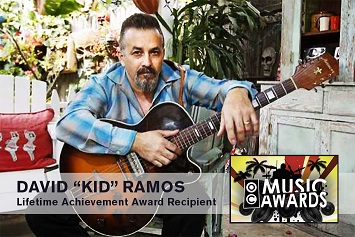 Award on David “Kid” Ramos. The guitarist was born in and has lived his entire life in Orange County, but has traveled the world playing the blues. His guitar can be heard on some of the most revered blues recordings over the past thirty five years. He has played with the most accomplished musicians and the most famous bands in the blues genre.
Award on David “Kid” Ramos. The guitarist was born in and has lived his entire life in Orange County, but has traveled the world playing the blues. His guitar can be heard on some of the most revered blues recordings over the past thirty five years. He has played with the most accomplished musicians and the most famous bands in the blues genre.
In September of 2012, Ramos was diagnosed with a rare form of cancer called soft cell sarcoma. After nearly a year and half battle with this disease the cancer is officially in remission.
Just days after our interview, which took place in April, Ramos played some old songs with some old friends at a concert in his home town of Fullerton. At one point the devoted family man even shared the stage with his two sons.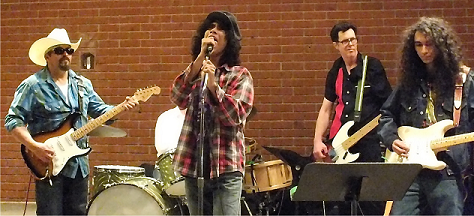
In a couple of weeks Ramos will play on one of the biggest stages on the world wide blues festival circuit at the Doheny Blues Festival, which also happens to be in Orange County.
I thought the time was right to visit with Kid Ramos. Enjoy a conversation I had with one of the great blues guitarists of our generation.
David Mac (DM): You grew up surrounded by music as your folks were opera singers.
Kid Ramos (KR): That’s right. My stepdad toured with The Metropolitan Opera and my mom was a soprano and they both were great singers. My mother is a full blooded Italian and my grandfather even saw Caruso in New York back in the very early part of the 20th Century.
DM: At any time did you ever consider a career in the opera field?
KR: No, but I love and appreciate the music.
DM: Did growing up around music and musical people, like your folks, set you on the path to becoming a musician?
KR: Yes it did. My parents were very artistic. We had singers over at the house all the time. My mom would cook pasta and sometimes they would sing all night long. Opera singing is loud man. I just remember trying to sleep and thinking ‘What are all these people doing in my house singing at two in the morning?’
We had a baby grand piano in the house that was my father’s. My mom ended up with it and I got it when my mom died. I have that piano in my home today. It is now in my living room and now my kids play it. My stepdad also played guitar, so we had guitars as well as a piano. He taught me my first chords. Yes, it was a very encouraging environment in which to grow up.
DM: Let’s talk about some of your first experiences with a guitar.
KR: When I was thirteen, my stepdad stopped touring back east with the opera company and opened his own business. He bought a gas station in nearby Anaheim. In the summertime I would just walk down Anaheim Boulevard and check out all the pawn shops. It’s all changed now, they tore all those old businesses down, but back then I used to go look at the musical instruments in the windows of the little pawn shops. I was enamored with the whole thing. I loved the look of the musical 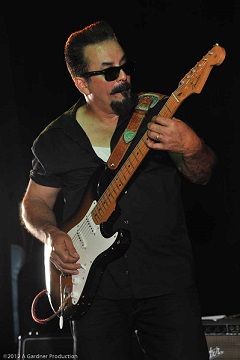 instruments. By the time I was fourteen I saved up enough money to buy my own guitar.
instruments. By the time I was fourteen I saved up enough money to buy my own guitar.
DM: Do you remember what it was?
KR: You bet I do. It was a Kay. I bought it for $37.50. It was a horrible guitar, but I loved it. It was real difficult to play. I had bleeding fingers and they would scab up, but I kept working at it. I just figured it was supposed to be hard to play. I didn’t know any better. Then when I heard blues music it made me really want to play the guitar. It was like an epiphany. I really wanted to learn. I set out to teach myself how to really play.
At that point my stepdad intervened and said, ‘It looks like you are pretty serious about this, so maybe it’s time to get you some lessons.’ So I went to Lincoln Music in downtown Anaheim. There was this guy who was about five years older than I was and he was this long haired hippie kind of dude who was in a band and he gave me lessons. The first thing he said was, ‘We have to get you a guitar. This thing is terrible.’
He had a friend who had a Gibson Melody Maker. It was a real nice guitar. It had a small scale neck and I picked that up from him for $75.00. It had a flower power sticker on it.
DM: (laughs) Oh No!
KR: Oh Yeah...I immediately scratched it off with my thumb nail. I took lessons from this guy for a short while and then I started taking lessons from a guy in Fullerton by the name of Larry Sampson. I soon realized that the stuff I wanted to learn I wasn’t going to get from a teacher.
DM: You have to get that stuff off the records.
KR: Exactly! So I started to go to Licorice Pizza and Tower Records...thrift stores, wherever. I bought whatever looked interesting or I’d pick up a record by someone whose name I had heard somebody mention.
DM: Are there any particular recordings that made an early impression on you?
KR: I remember getting into B.B. King Live at the Regal. I would listen to that over and over again. I would try and figure out how to make those sounds. That’s how really I learned, by picking up the needle and moving it back to a particular spot over and over and over again. I would just wear that record out.
DM: When did you start to venture out and hear live music?
KR: I got my driver’s license when I was sixteen. I bought a 62’ Chevy Impala for $200. Then I could drive a half hour or so down to the Golden Bear in Huntington Beach. That was such an incredible place. The Golden Bear changed my life.
DM: How so?
KR: It is where I first saw B.B. King, Albert King, Freddy King, Muddy Waters, Mike Bloomfield, Buddy Guy and Junior Wells. I could then see how they were making the music. I would think, ‘So that’s how they do that.’ It just was a natural progression in the educational process for me. I remember you could get in to see the first set if you were under age because they served food. Then they would clear you out before the second set.
DM: I have talked to so many musicians through the years who grew up like we did here in Southern California and have told me how important the Golden Bear was to them. Did you start to meet other musicians hanging out there?
KR: I met Rod Piazza and Junior Watson and those guys there even before I met James Harman. They were opening for somebody as I recall. I met Hollywood Fats there as well. Meeting other people that were into what I was into was important, but what really changed things for me was meeting James Harman. He opened up a whole new world for me. He taught me a lot of stuff about the music that I wasn’t hip to. I mean I was just this really young kid from Orange County. He was like a professor. James just had such knowledge and such an extensive blues record collection. We would have listening parties. I would go over to his house and we would barbeque, drink beer and listen to records all night.
DM: Let’s talk about the James Harman Band in those days. Who was in the band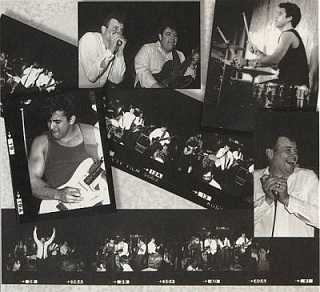 when you came on board?
when you came on board?
KR: It was Gene Taylor on piano, before he left to play with the Blasters, and we had Willie J. Campbell on bass and Stephen Hodges on drums.
DM: I take it around the time that Gene left the band, some other guitar player joined the band. Let’s talk about that player.
KR: Hollywood Fats! When he got in the band he also helped in my own development because he was a walking encyclopedia of styles. He could play anything. I tried to glean as much from him as I could by standing on stage with him for the years he was with the band. James was 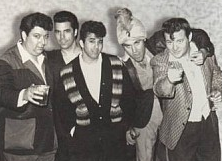 very cool about bringing Fats on. He told me ‘You are the guitar player in this band. If you don’t want to play with Fats, just say so.’ For me I thought of it as a wonderful opportunity to learn from one of the all time greats. He was very gracious to me. He never tried to intimidate me.
very cool about bringing Fats on. He told me ‘You are the guitar player in this band. If you don’t want to play with Fats, just say so.’ For me I thought of it as a wonderful opportunity to learn from one of the all time greats. He was very gracious to me. He never tried to intimidate me.
It was just so sad that he left us so early because he was just head and shoulders above everybody else. I don’t know if the best stuff he ever played was ever recorded.
DM: What do you mean?
KR: Back in those days we would play six nights a week and he would just play these amazing solos night after night and take you places that you have never been. He was just an incredible improviser with such great tone. He got over with the audience every time. He just taught me so much. Not in any type of formal sense, but just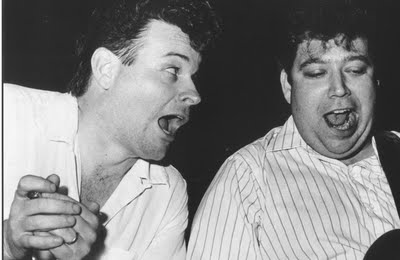 being on stage with him and absorbing or trying to absorb his stuff. I think he influenced me in ways I don’t even realize sometimes. To this day, every so often I will play something and think for a moment, ‘Where did that come from?’ In many cases it came from Fats.
being on stage with him and absorbing or trying to absorb his stuff. I think he influenced me in ways I don’t even realize sometimes. To this day, every so often I will play something and think for a moment, ‘Where did that come from?’ In many cases it came from Fats.
He was a true child prodigy. I think he was only sixteen when he played with J.B. Hutto and then he went on the road with Muddy Waters. He lived at Muddy’s house for a year when he was just eighteen. He played with Jimmy Witherspoon, John Lee Hooker as well as Albert King. He did all of this before hooking up with Al (Blake) and those guys and forming The Hollywood Fats Band. So you only have that one album they put out and only three or four albums with James. It is just a shame that there wasn’t more of his stuff recorded and that he never got his due because he died so young.
DM: You also crossed paths with another guy who left us way too soon...
KR: That’s right. I met Lester Butler (The Red Devils) through Fats. They were friends. When I first met Lester, I didn’t even know he was musician. I just thought he was another drug friend of Fats. I played with Lester before he got the record deal. I was in his band before Paul Size joined. I had really high hopes for that guy. It is just another real sad story and such a waste.
DM: That is so true. Let’s talk about a singer who you have recorded with going all the way back to your first solo album, Lynwood Slim. How did that association come about?
KR: I first met Slim in the 80’s at a place in Minneapolis called The Caboose. He was the sound man there. I played that place when we rolled through town with the Harman Band. He was from Southern California like us, but he moved to Minnesota in the mid 70s. On this particular night my reverb tank wasn’t working, so he said, “I got a reverb tank, I’ll lend you mine.”
So I got in the car with him. We went on this wild 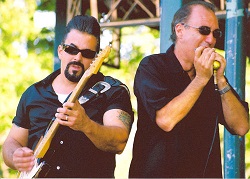 drive in downtown Minneapolis. There were cars everywhere and they were doing road work and he is driving this big battleship, I think it was an Oldsmobile. The way he was driving, I am thinking ‘I am going to die in a car with this guy.’ So we get to his place at three in the morning and his girlfriend is sleeping and he says, ‘Hey wake up. You got to meet Kid Ramos.’ I am thinking ‘Leave the poor girl alone and let her sleep.’ So that was the first time I met Lynwood Slim.
drive in downtown Minneapolis. There were cars everywhere and they were doing road work and he is driving this big battleship, I think it was an Oldsmobile. The way he was driving, I am thinking ‘I am going to die in a car with this guy.’ So we get to his place at three in the morning and his girlfriend is sleeping and he says, ‘Hey wake up. You got to meet Kid Ramos.’ I am thinking ‘Leave the poor girl alone and let her sleep.’ So that was the first time I met Lynwood Slim.
DM: You didn’t really work with him until a couple of years later when he moved back to California.
KR: That’s right. I still had his reverb tank and I took it back home to California. Then I didn’t hear from him for a couple of years when I get this call. He had moved back here and said, ‘Do you want to do some gigs with me?’ We have been friends ever since. We have never even had a cross word with one another in all the years I have known the guy. He has been on every one of my solo records and I had actually recorded with him prior to that on Made in America which was recorded in Newport Beach. Slim and Larry Taylor produced that record.
DM: In my mind one of the outstanding albums to come out in the past fifteen years or so is West Coast House Party.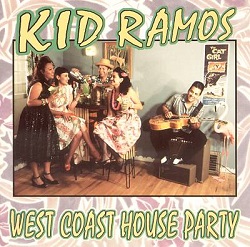
KR: That might be my favorite album.
DM: There has to be an interesting story as to how that came about. For instance how did you get Clarence “Gatemouth” Brown’s to play on that record? I don’t think he has done many, if any, guest slots on other people’s stuff.
KR: By the time that record was made I was touring with The Fabulous Thunderbirds. We did a tour playing in these real nice big performing arts theatres with Gate. We had C.J. Chenier open then Gate would come on. Don’t ask me why, but we would headline. I think it should have been the other way around, but anyway, we got to play on stage together every night. During our set we would bring him out and we would all do an instrumental, Honky Tonk or something like that.
So we used to hang out together. We would eat dinner together on the road. He would even call my house just to check in. I’d pick up the phone and there he was. ‘This is Gate just checking in to see how things are going.’ He found in me what he felt was a kindred spirit. To me, I was just a huge fan of his music of course.
So that relationship gave me the idea to make a record like West Coast House Party. A great deal of credit should also go to Jerry Gordon at Evidence Records who let me 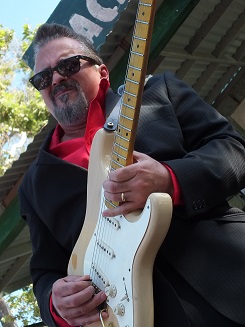
DM: How was that album recorded? Was it done in different sessions over a period of time?
KR: No, we did it all at once and all together. We did it live in two days. It was a house party man. I had catering brought in and we just knocked it out. I tried to find material that would be the best fit for the different players.
DM: The list of people is really something. What strikes me as interesting is that you are a guitar player, but you have so many other guitar players on the thing.
KR: We had Duke Robillard, Junior Watson, Little Charlie Baty, Rusty Zinn and of course, Gate. It is about the mutual respect we have for this music and for one another. This isn’t a track meet or a contest it is about respect. That’s what makes this record work. It really is one of my favorite records.
DM: There are several things about this record I like not the least of which is the opening and closing track which are two different takes on the T-Bone Walker instrumental Strollin’ With Bones. That’s such a great choice.
KR: I have this book and in it there is a photograph from the late 40’s with T-Bone and Gate and they are standing in front of a sign that says something like ‘The Battle of the Blues Guitars.’ So I thought how cool would it be to do the song Strollin’ With Bones with Gate. I also wanted to get Duke on those two tracks because he is a huge T-Bone Walker devotee. We start the song differently than on the original record simply because that’s what Gate wanted and I am not going to argue with him, so that’s what we did. All three of us take turns soloing and our sounds are so different from one another that I think it is pretty easy to tell who is playing what. It was just so cool to play with all these great people.
Many of the great singers on the record are people I worked with and of course are friends.
DM: Such as...
KR: There is Slim of course. Harman, Kim (Wilson), Janiva 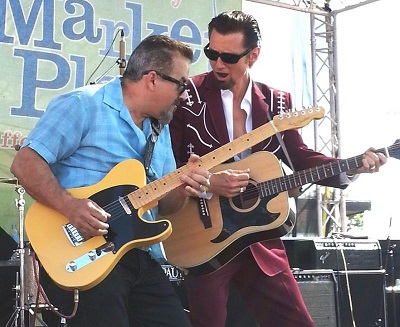 (Magness), Big Sandy and my long time pal James Intveld, who by the way I am playing with this Thursday in Fullerton.
(Magness), Big Sandy and my long time pal James Intveld, who by the way I am playing with this Thursday in Fullerton.
DM: You had alluded earlier that you had already been on the road with The Fabulous Thunderbirds when West Coast House Party was released in 2000. That is a huge, high profile gig. Let’s talk about your experience with that band.
KR: I actually saw that band for the first time in Washington, D.C. in 1979. We saw them at a club called The Bayou. I never even heard of these guys. We walked in there and they just blew my mind. They were just so good and so greasy. They were playing the blues the right way.
So when I got back to California I picked up their first record, Girls Go Wild. I would see them every chance I got when they came out here. I saw them at the Golden Bear and at The Whisky up in Hollywood. I was just a big fan.
One night, when I was playing with the Harman Band at The Belly Up Tavern down in Solana Beach, Kim came to our show and James let him sit in with the band. He wouldn’t get off the stage. Harman just sat down and Kim played the rest of the night.
At that time after Jimmie (Vaughan) left the band,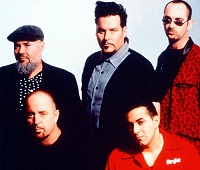 Kim was making those first two solo records and he had Larry Taylor on bass and Richard Innes on drums, with whom I had played. When he told them he was going to put the T-Birds back together, those guys told Kim about me and he remembered me from playing at The Belly Up.
Kim was making those first two solo records and he had Larry Taylor on bass and Richard Innes on drums, with whom I had played. When he told them he was going to put the T-Birds back together, those guys told Kim about me and he remembered me from playing at The Belly Up.
When the chance came to join the band in 1990 it was such a great opportunity for me, but I was concerned about the travel. My first son was born and I knew I would be missing out on a lot of things. I felt it was a real honor to be part of this band. It was an opportunity that I just couldn’t turn down. Opportunities like that for a blues musician don’t come around that often.
DM: Did it ever cross your mind anytime after seeing that band in Georgetown that years later you would be in that band?
KR: (laughs) NO WAY. If someone would have even suggested that, I would have told them that they were crazy.
DM: How did you feel about stepping into a guitar slot in a band that had in it previously, Jimmie Vaughan and Duke Robillard?
KR: Well of course that was a little intimidating, but I had confidence that I could do what I could do and make it work. I decided early in my career that even though I have my influences, like all musicians do, I would do my own thing. I mean I couldn’t very well be Jimmie Vaughan. There is only one Jimmie, so I would just have to do my thing. As far as being intimidated, standing on the same stage with Hollywood Fats, that’s intimidating. I mean every night he would peel off these solos for five minutes and the crowd was going nuts and then when he was done he would look over at me. It was like you just wanted to put your guitar down and go home. So I knew I would just have to find my own voice I brought my thoughts about that experience with Fats to the T-Birds. I will always play from my own heart, with my own voice and give it everything I got. That has always been my motto.
So when I got into the Thunderbirds I took the same approach. It was a really great band and a great ride for me for seven years.
DM: In a way your run with the 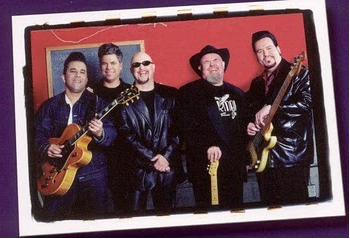 Thunderbirds was somewhat of a James Harman Band reunion.
Thunderbirds was somewhat of a James Harman Band reunion.
KR: Exactly! We had Hodges and Willie J. in the band at that time. Oh, and Gene Taylor was in the band at that time as well on piano.
DM: Even though this was a high profile and very prestigious gig, you left the band. Why?
KR: I had another son and it was getting harder and harder being on the road. I knew I would miss out on way too much stuff by being away. You never get that time back. It is only a once in a lifetime thing that you have the opportunity to raise a family. Once I had that realization, it was a pretty easy decision to make.
Also, I think it had pretty much run it’s course, like all things do in life. We did up to 200 dates a year in those days. It was a great ride, but I wanted to pursue my solo career, be able to go in different directions and do more gigs here at home.
DM: ...and in those days there were so many places to play right here in Southern California.
KR: That’s right. The places are all gone now, but in those days there were so many places to play and be home every night.
DM: Around this time period you got together with an early incarnation of the Delta Groove Music house band, The Mannish Boys.
KR: That’s right. I knew Randy going back to the 80’s. I had met him when I was in the Harman Band. Through the years he was friends with Lester Butler. Randy put on some shows with The Red Devils while I was playing guitar in the band. So when he started Delta Groove Music, it was just a natural progression. So we did a little travel to some of the European festivals, we got booked on the blues cruise and I started with them on their second album.
DM: There is another project that you were heavily involved with that is of great interest to me and it was the 2006 performances, CD and subsequent film that was released on March 6, 2013, entitled Time Brings About a Change: A Floyd Dixon Celebration. Let’s talk about that project and your involvement.
KR: Thanks very much for bringing that up. There was this guy named David Budge. He worked with The Thunderbirds on the Roll of the Dice album. Bob Auerbach is a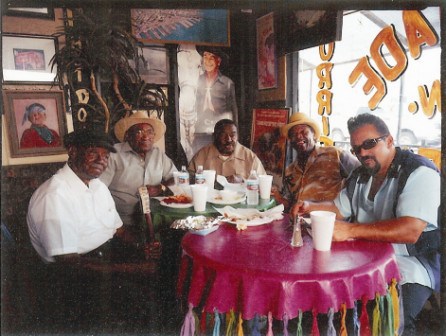 guy who had befriended Floyd Dixon and took him into his home. He put out a CD on Floyd and had an idea for this project and David Budge put me together with Bob. He contacted me and told me his plans for this project and also told me in confidence that Floyd was sick and not doing so well. He said, ‘I don’t think he is going to live much longer.’ I am a huge fan of Floyd’s music. I love all those records he put out in the 1950’s. So I went to Bob’s house in Orange, California. Bob, Floyd and I sat down and had a real nice meeting. I told them some of my ideas.
guy who had befriended Floyd Dixon and took him into his home. He put out a CD on Floyd and had an idea for this project and David Budge put me together with Bob. He contacted me and told me his plans for this project and also told me in confidence that Floyd was sick and not doing so well. He said, ‘I don’t think he is going to live much longer.’ I am a huge fan of Floyd’s music. I love all those records he put out in the 1950’s. So I went to Bob’s house in Orange, California. Bob, Floyd and I sat down and had a real nice meeting. I told them some of my ideas.
DM: What were some of those ideas?
KR: I told them the first thing they have to do is find the right musicians who understand Floyd’s style of blues. They agreed. So I produced the record and became the musical director. I found who I thought were the right guys to play with Floyd. I remember we did a couple of rehearsals at Bob’s house. The first one I’ll never forget. We have Larry Taylor on upright bass, Richard Inness on drums. We got horn players Steve Marsh and Troy Jennings. I am playing a hollow body guitar. We are doing one of Floyd’s old tunes and he jumps up from his piano bench and said, “You guys know how to play. You understand my stuff.”
DM: That kind of a compliment, Kid, is something that I suspect will remain with you for the rest of your life. Here is a guy who at that moment realized that his music still resonates with musicians sixty years later. For my money the great 50’s rhythm and blues bands on the West Coast represent some of the greatest music ever made and Floyd Dixon is right in the middle of all of that.
KR: Absolutely! Absolutely! That was one of the real highlights of my career. I mean Dave, the joy on Floyds face. Every one of us was just so happy to be there and to be a part of that experience. I got to spend time with him. I had him over to my house for dinner. He was just such a wonderful human being, as well as one of my heroes.
So we went over to The Rhythm Room in Phoenix and recorded two nights of music and put the best stuff out on CD later that year. On July 26, 2006, just six weeks after we did the celebration concert Floyd passed away. The film had its world premier in March of 2013. I know you were at the premier of that movie Dave; do you remember just the joy on his face in that film?
DM: I do. I am just so glad you were able to do that tribute to him before he passed. You helped to give joy to someone on the last few weeks of his life. Kid, you and I can talk about vintage West Coast rhythm and blues all night, but let me shift gears a bit and talk about a band that I am also quite fond of and that is Los Fabulocos.
KR: I first met Mike Molina and Jesse Cuevas when they were with the band The 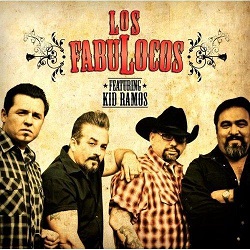 Blazers with Big Manny. We became friends. I sat in with them on some shows. Jesse was beginning to emerge as a great singer. One day he called me and described the project he had in mind. He said ‘Do you know anybody who would be interested in playing guitar and bajo sexto?’ I don’t play bajo sexto, but I’d be willing to learn. So we got together and he showed me a few chords on the bajo and I started to do my thing with that instrument. The instrument demands a lot of physical strength to play. It has twelve strings. The neck is like a baseball bat.
Blazers with Big Manny. We became friends. I sat in with them on some shows. Jesse was beginning to emerge as a great singer. One day he called me and described the project he had in mind. He said ‘Do you know anybody who would be interested in playing guitar and bajo sexto?’ I don’t play bajo sexto, but I’d be willing to learn. So we got together and he showed me a few chords on the bajo and I started to do my thing with that instrument. The instrument demands a lot of physical strength to play. It has twelve strings. The neck is like a baseball bat.
DM: What was Randy’s reaction to the project?
KR: As you might suspect Dave, I needed to talk him into it. It was different. I mean we have an accordion all over the record.
DM: Yeah, but good music is just good music...PERIOD.
KR: That’s my point of view as well. It is Americana. We are a melting pot and those two records we put out on Delta Groove reflect that. So we went into the studio and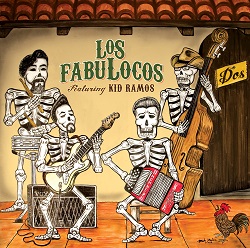 knocked the record out in a couple of days. I gave it to Randy and said, ‘So what do you think?’ I couldn’t wait for his reaction. He said he liked it so he put it out.
knocked the record out in a couple of days. I gave it to Randy and said, ‘So what do you think?’ I couldn’t wait for his reaction. He said he liked it so he put it out.
We got a nice little buzz off of the thing. We had a nice little four year run or so. We went to Texas two or three times, where they have pretty eclectic tastes in music. We went to Europe once. We had a blast playing that music. I actually am going to do some more dates with them this summer. We have a gig booked at Nick’s Taste of Texas this June.
I like playing that stuff. It is dance music. I like playing behind an accordion. It is like a polka. The point is with music, if you are expressing something from your soul, it doesn’t matter what it is.
DM: Amen to that! Yesterday thanks to Scott Abeyta of Rip Cat Records I received an advance copy of the re-issue of Two Hands One Heart. I listened to it last night and it 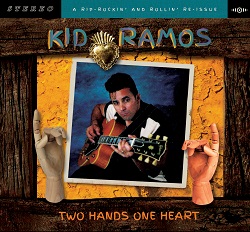 sounds extraordinary. What are your thoughts?
sounds extraordinary. What are your thoughts?
KR: I agree. I think it sounds better than the original. It swings really great. I hadn’t heard it in years and then Scott and I listened to the remixed and re-mastered version I thought, ‘This really holds up.’ I think this music deserves to be heard again because it had been out of print for so long.
Since we originally made that record twenty years ago there are three guys who worked on the album who are now longer with us. Sax man Spyder Mittleton, John “Juke” Logan who plays organ on the record left us recently and one of the album’s producers, Jerry Hall passed away just a couple of months ago. We dedicate the re-issue of this material to their memory.
DM: First off you can’t find a better singer than Lynwood Slim. He sounds great on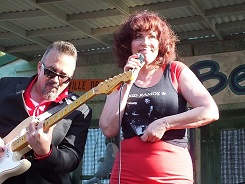
KR: I think so too. Slim is so under rated and he was right in his prime when we made this record. He sounds so good. Janiva sounds really good too.
DM: The album is great, again, one of my favorites. So, let’s talk about your interests outside of music….what keeps Kid Ramos going?
KR: The most important thing for me is my family. They always come first. My two boys are my legacy. This is what sustained me with this recent battle with cancer. My family and my faith sustained me. There was also an outpouring of concern and financial assistance during this time from people I don’t even know. I am just so grateful for their support. I mean Dave, this came from people from all over the world. It really humbled me. It changed my perspective on so many things.
DM: How so?
KR: Well for starters, it made me realize how fragile life can be. I always thought of myself as being a pretty healthy guy. It is pretty amazing to think that something you don’t even see can bring you down to your knees. It changed my perspective on so many things. I have always been a Christian, but it brought that into focus. I don’t preach or anything. People can believe whatever they want, but I have always had a personal relationship with the Lord. It is just a personal thing. It is what sustained me through the whole thing.
I remember when I got a call one day from my oncologist and he pretty much laid the whole thing on the line with me. He told me about the cancer, the chemo treatments, what that meant, the whole thing. I was on my cell phone in my car and I just had to pull over to the side of the road and cry. It was just so overwhelming. I just let it all out. I thought I may not survive this. So, I said to the Lord, ‘You carry this. My shoulders aren’t big enough to carry this.’ So by surrendering that I had a peace that I can’t explain. I never felt sorry for myself. I never got too depressed, but I am not going to lie to you Dave, the physical part was really hard. Chemo is essentially torture and that was hard. I don’t wish that on anybody. Mentally and spiritually I was okay though.
I just knew I couldn’t fight something I couldn’t see. I have been a fighter my whole life. I am always up for a good scrap. So that doesn’t bother me, but you can’t fight something you can’t see. This is something that I had to put into the hands of the Lord because I had absolutely no control over this. The doctors don’t even have a clue. You ask them anything and even they can’t tell you. They say the same thing, ‘We just don’t know. Everybody is different.’ They always say, ‘Let’s wait and see.’ That’s why they call it a practice, you know. It’s really true. By the time it was all over I had gone through radiation, chemo, surgery, more chemo and we are talking five days a week, six hours a day of chemo. I went through twelve rounds of that.
DM: That is incredible…and you are still here, still playing and living your faith. What else would you like people to know about Kid Ramos?
KR: I always just tried to do the best job I could do. I don’t try and think too highly of myself and I try and give all the glory to God. It’s those three things I think about every time I play. If people still want to hear me play, I’ll be out there. I’ll be playing somewhere.
DM: Fans of your music are just so glad we still get to hear you out there.
KR: Thanks Dave.
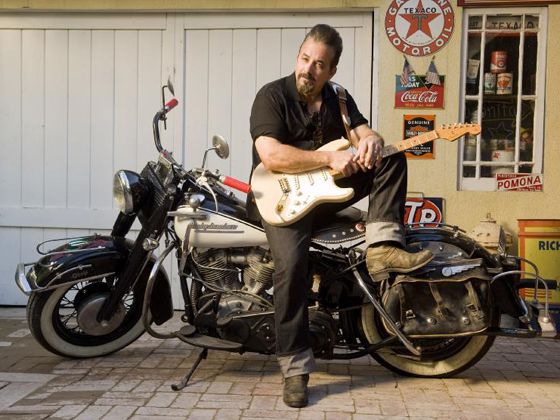
Copyright 2022 BLUES JUNCTION Productions. All rights reserved.
BLUES JUNCTION Productions
7343 El Camino Real
Suite 327
Atascadero, CA 93422-4697
info